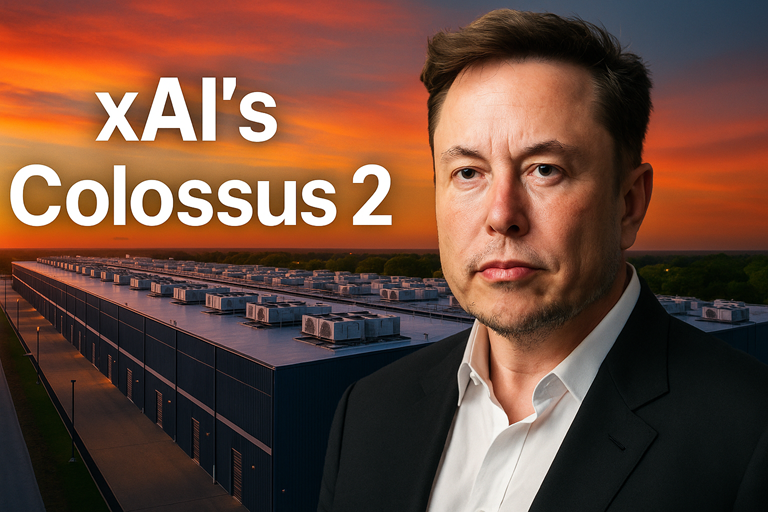🚨 Colossus 2: The Gigawatt Data Center Revolution by xAI
In the age of AI, speed and processing power determine the future of technology. xAI led by Elon Musk has redefined industry standards with the introduction of Colossus 2, the world’s first gigawatt data center. This massive facility with 1.1 GW capacity can train advanced AI models at unprecedented speed.
In less than six months, part of the project became operational, and now OpenAI, Google DeepMind, Anthropic, and Microsoft face a serious competitor. Can xAI turn this multi-billion-dollar ambition into reality without encountering financial, environmental, and political challenges?
🏗️ Colossus 2 Construction Path
From purchasing an abandoned warehouse in Memphis to installing thousands of GPUs and chillers, xAI launched its gigawatt data center in less than six months. This section shows the key construction stages and Colossus 2’s extraordinary capacities.
🏢 Warehouse & Land Acquisition
According to SemiAnalysis, on March 7, 2025, xAI purchased a one-million-square-foot warehouse and 100-hectare land in Memphis.
❄️ Chiller Installation & Cooling
Less than six months later, on August 22, 2025, the site saw the installation of 119 air-cooled chillers, providing 200 MW of cooling capacity.
💻 GPU Processing Power
Enough to run 110,000 Nvidia GB200 NVL72 GPUs simultaneously. By comparison, similar projects by Oracle or OpenAI took an average of 15 months.
📊 Colossus 2 Key Metrics
Linear representation of Colossus 2’s current vs target capacities and resources.
Power Capacity (MW)
GPU Deployment
Construction Progress
Cooling System Deployment
⚡ Power Game: Supplying Colossus 2
Without stable energy, no data center can operate. xAI solved Memphis’ legal restrictions and the need for powerful energy with a dual strategy.
- 🏛️ Legal restrictions in Memphis prevented installing gas turbines.
- ⚡ xAI purchased a former Duke Energy power plant in Southaven, Mississippi and received a 12-month temporary permit for gas turbines.
- 🔋 Tesla Megapack batteries and new transmission lines deliver Mississippi power to Memphis.
💬 xAI’s dual strategy allows the data center to manage legal risk while rapidly scaling energy capacity.
💰 Colossus 2 Investment Puzzle
Building a gigawatt data center costs billions. xAI uses a combination of internal funds and external investment.
- 💵 Construction cost: Estimated by SemiAnalysis at tens of billions of dollars.
- 📊 Current revenue: xAI has minimal external revenue; mostly funded by internal transfers with X.com.
- 💡 Fundraising plan: Elon Musk aims to raise $40B new capital. Likely sources include Middle Eastern sovereign wealth funds.
💬 Smart, blended financing ensures Colossus 2 stays on track for success.
🏦 Side Effects on Tech Giants
Launching Colossus 2 changes the game rules for other players:
OpenAI & Microsoft
Must accelerate data center construction to keep up.
Google DeepMind
If xAI applies its reinforcement learning (RL) methods, Google’s research advantage is threatened.
Anthropic
With limited financial resources, will likely face the most pressure.
Oracle & AWS
GPU rental and cloud services markets may be at risk with xAI’s entry.
📊 xAI vs Competitors Table (2025)
| Company | Current Data Center Capacity | Development Speed | Primary Financial Sources |
|---|---|---|---|
| xAI | 200 MW (Goal 1.1 GW by 2027) | 6 months | Private capital + Middle East |
| OpenAI (with Microsoft) | ~450 MW | 15 months | Microsoft Cloud + Azure |
| Google DeepMind | ~500 MW | 12–14 months | Google Cloud + Ads |
| Anthropic | ~150 MW | Over 18 months | Amazon + Limited Capital |
| Oracle Cloud | ~350 MW | 15 months | Commercial Cloud |
| AWS | ~700 MW | Stable | Amazon Web Services |
⚠️ Risks & Challenges for Colossus 2
Every gigawatt data center faces multiple risks. Colossus 2 is no exception. Key challenges include:
- 💸 Financial: Maintaining operations and scaling GPUs requires billions in funding.
- 🌎 Environmental: High energy consumption could lead to local protests or regulatory fines.
- 🛡️ Technical: Cooling, transmission stability, and GPU management at this scale are unprecedented.
- ⚖️ Legal & Political: Memphis and Mississippi laws may restrict gas turbine usage, requiring creative energy solutions.
- 🚀 Competitive Pressure: OpenAI, Google, and AWS may accelerate their own projects to counter xAI.
💬 Risk management is crucial for xAI to sustain the gigawatt advantage.
🔮 The Future of xAI and Colossus 2
Colossus 2 is more than a data center; it is a milestone in AI history. The following points highlight its expected influence:
- 🤖 AI Advancement: Training large-scale AI models faster than any competitor.
- 🌐 Industry Shift: Competitors may need to invest in multi-gigawatt projects.
- 💡 Innovation Hub: Memphis becomes a center for high-performance AI research.
- 📈 Economic Impact: Job creation, technology partnerships, and local business growth.
💬 Colossus 2 could redefine the AI landscape for decades to come.
✅ Conclusion
xAI’s Colossus 2 demonstrates what is possible when ambition, technology, and funding converge. With a 1.1 GW goal, rapid construction, and cutting-edge GPU management, xAI challenges global AI competitors and sets a new benchmark.
💬 Colossus 2 is a reminder that the AI race is not just about software, but about the physical infrastructure that powers it.
❓ Frequently Asked Questions (FAQ)
A data center with a final capacity of 1.1 gigawatts for AI model training, built by xAI and Elon Musk.
Higher speed means faster model training and a competitive advantage over other companies.
Nvidia GB200 NVL72, approximately 110,000 units in the first phase.
A combination of gas turbines in Southern Mississippi and Tesla Megapack batteries.
Pressure on OpenAI, Google DeepMind, Anthropic, and AWS to increase development speed and investment.

